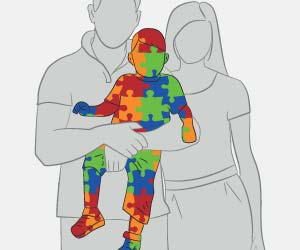Supplementing multivitamins during pregnancy influences brain development and could reduce risk of impairment in intelligence due to autism.
Highlights
- Nutritional supplementation during pregnancy is associated with a reduced risk of autism spectrum disorder (ASD). //
- Multivitamin use with or without additional iron or folic acid, or both was associated with lower odds of ASD.
- Either iron or folic acid use was inversely associated with ASD prevalence.
Nutrient Supplementation During Pregnancy
The research team applied three analytical methods to a sample of 273,107 mother-child pairs living in Stockholm, Sweden. The sample was restricted to children who were 4 to 15 years of age by December 31 2011 and were born between 1996 and 2007.
Women reported their use of folic acid, iron, and multivitamin supplements at their first antenatal visit and cases of child ASD were identified from national registers.
The research team found that multivitamin use, with or without additional iron and/or folic acid, was associated with a lower likelihood of child ASD with intellectual disability relative to mothers who did not use folic acid, iron, and multivitamins.
Autism Spectrum Disorders
Autism results due to a neurological disorder that affects the normal brain function. There is no single cause known for autism. As compared to a normal child, autistic children do not reach the developmental milestones like crawling, walking or saying the first word on time.
Instead, they are very special children who have difficulty in communication and social interaction. They often come across as those who remain engrossed with restricted and repetitive behavior patterns. No two people with autism will have exactly the same symptoms. Therefore, health care providers think of autism as a ‘spectrum’ disorder.
Facts and Statistics on Autism
- Autism spectrum disorder occurs in 1 in 160 children worldwide.
- This estimate is an average and is on the lower side. Some controlled studies predict higher numbers.
- The Centre for Disease Control and Prevention (CDC) reports 1 in 68 children in the United States to have autism-related disorders. This has increased compared to a number of 1 in 88 kids in 2012.
- It is estimated that prevalence is increasing globally due to awareness, better diagnostic tools and criteria and better reporting.
Reference
- Elizabeth A DeVilbiss, Cecilia Magnusson, Renee M Gardner, Dheeraj Rai, Craig J Newschaffer, Kristen Lyall, Christina Dalman and Brian K Lee.
‘Antenatal nutritional supplementation and autism spectrum disorders in the Stockholm youth cohort: population based cohort study’, BMJ (2017), https://doi.org/10.1136/bmj.j4273.
Source-Medindia
















